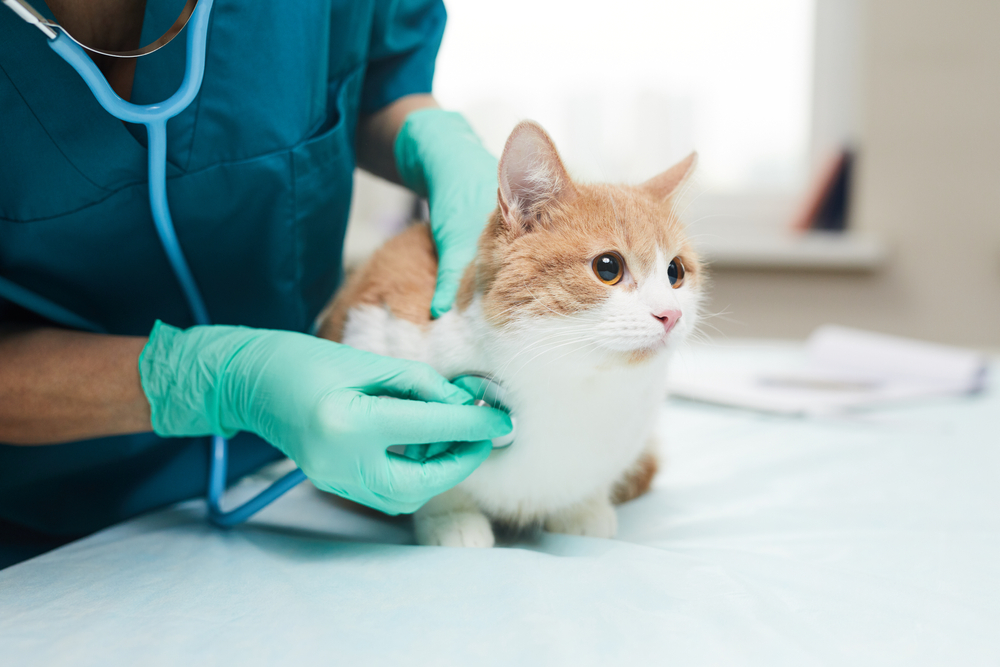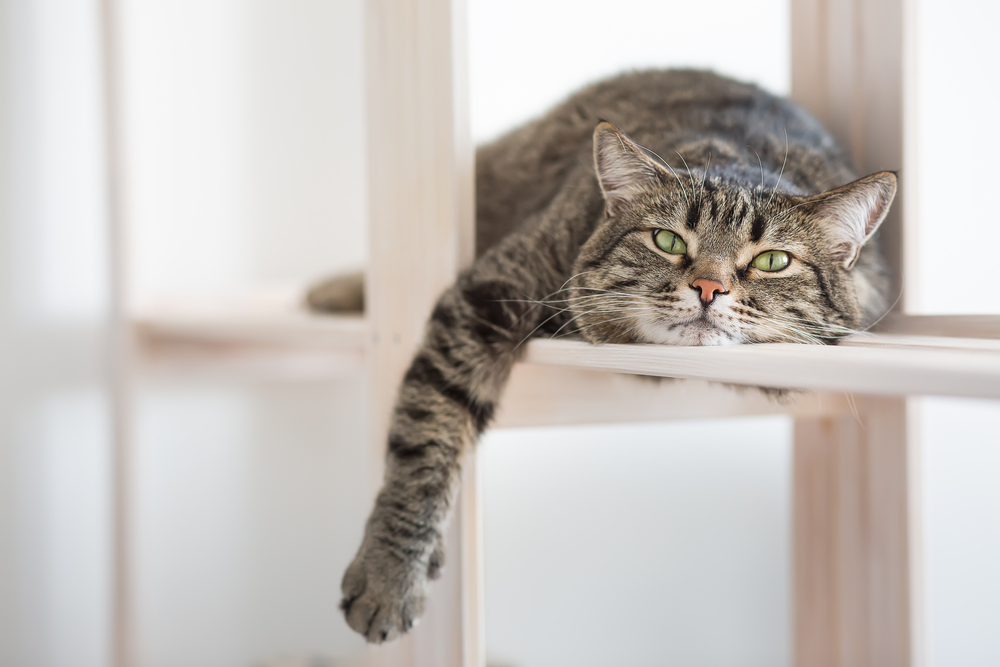Indoor cats appear to have relatively clear-cut needs—food, water, shelter, and a litter box. But behind their sedentary behavior and contemplative gaze, indoor cats are complex creatures who have instinctive desires, innate habits, and socialization requirements. Satisfying your cat’s unexpressed needs is important, and can drastically improve their physical and behavioral health. Our Boca Midtowne Animal Hospital team’s guide explains how your cat’s emotions affect their health, and describes five steps you can take to improve their happiness.
How your cat’s happiness affects their health
Stress commonly causes or contributes to many feline behavior and health disorders. Some cats struggle with life’s changes—rather than adapting—releasing their stress in inappropriate ways, including:
- Obsessive behaviors — Stress can manifest as excessive grooming , overeating, or consuming inappropriate objects.
- Misdirected behavior — Scratching, climbing, stalking, and pouncing are natural predatory behaviors. If your cat is unhappy, they may decide to satisfy their instinctive behavior on your furniture, family, or other pets.
- Personality changes — Stressed cats may become defensively aggressive, or their activity level or sociability may noticeably change.
- Health conditions — If your cat experiences chronic stress, they may develop urinary disorders, skin disease, respiratory infections, endocrine disorders, and obesity.
Indoor cats are more likely to experience stress than their free-roaming friends, because the opportunity to satisfy their natural behaviors is limited. While our Boca Midtowne Animal Hospital team members strongly believe that keeping your cat indoors is the safest lifestyle choice, we recommend monitoring their instinctive needs to ensure that they have a healthier and more satisfying quality of life.
A happier cat
Because cats are a naturally independent predatory species, they need to satisfy their innate behaviors such as hunting instincts, access to resources, and mental stimulation. Praise and petting may satisfy a dog, but cats are more difficult to impress. Follow these five easy steps to improve your cat’s emotional and physical health.
#1: Wild at heart—create a cat-friendly environment
Climbing, scratching, stalking, and rough play satisfy instinctive feline predatory behaviors. As hunters in the wild, cats spend 80% of their waking hours searching for food—a behavior cycle that includes seeking, approaching, and capturing their prey. These instincts cause the exact behaviors many indoor cat owners find costly, inconvenient, and frustrating. To prevent your cat from demonstrating their natural behaviors on your furniture or your flesh, create dedicated areas in your home where your cat can satisfy their instincts. Encourage your cat to express themself—safely—by creating a cat-friendly environment where they can:
- Scratch — Scratching allows cats to stretch, maintain nail health, and communicate. Place a dedicated scratching post or mat near your cat’s favorite spot in the house. To make your cat’s scratching post more attractive, apply Feliscratch to the surface.
- Hide — Every hunter needs a vantage point where they can covertly observe. If you have an open-concept home, use furniture to create visual barriers and secret pathways.
- Climb — Elevated perches help cats feel secure, especially during rest. Cat trees or shelving with nonslip matting offers your climbing cat a tempting tower.
- Rest — Cats seek out warm and quiet places to rest. Provide cozy beds in a few of your home’s private areas to help your cat feel safe and secure.
- Stalk and pounce — Laser pointers, or motorized or erratic moving toys simulate prey, and encourage your cat to play in a naturally satisfying way. Put away these toys after a play session to prevent your cat from becoming bored.
#2: Attention, please—socialize daily with your cat
Cats may be independent, elusive, and aloof, but they still desire social interaction. Without socialization, cats may suffer from depression, anxiety, and boredom. Dedicate a few minutes—or more—every day to spending time with or near your cat—letting them decide what kind of attention they prefer, which may include:
- Physical touch (e.g., petting, scratching, or brushing)
- Toy play
- Observing you from a distance
Respect your cat’s preferences, and over time, your little wallflower might become a social butterfly, or—at least—a garden flower.
#3: On the prowl—encourage your cat to hunt for their food
Wild or feral cats must continuously work for their food by hunting, foraging, or scavenging. In contrast, most indoor cats have scheduled meals delivered in a lump to the same location every day. This predictability results in a sedentary lifestyle, boredom-induced overeating, or finickiness.
Consider replacing your cat’s bowl with a feline enrichment toy or game to increase their physical activity, provide an outlet for predatory behavior, and nourish their body as well as their mind. Some popular enrichment options include:
- Food-dispensing toys
- Reach boxes
- Foraging toys
- Grooved silicone lick mats for wet food
DIY enrichment ideas are listed at this website. Always supervise your cat’s play, and regularly check toys for damage.
#4: On-demand—ensure your cat’s resources are accessible
When you cannot find what you’re looking for, you often feel helpless, frustrated, and stressed. Your cat feels the same way when they cannot access their basic resources (e.g., food, water, bed, litter box, toys). Barriers to access can include bully cats or resource-guarding dogs, or the barriers can be physical challenges such as stairs, perches, or distance.
To alleviate resource-related stress, provide each household pet ample resources, and always add an extra, ensuring senior, arthritic, or vision-impaired cats have at least one area in which they can access their necessary resources.
#5: Take care—maintain your cat’s annual wellness care

Cats are masters at hiding illness and pain, making their annual wellness exam with Boca Midtowne Animal Hospital imperative. In addition to early disease detection, parasite screenings, and vaccinations, routine visits are an opportunity to talk with our veterinarian about any changes in your cat’s behavior, activity, and personality.
As a Fear Free Certified practice, our Boca Midtowne Animal Hospital team prioritizes your pet’s emotional well-being and their physical health. To schedule your cat’s Fear Free veterinary exam, contact our team.








Leave A Comment